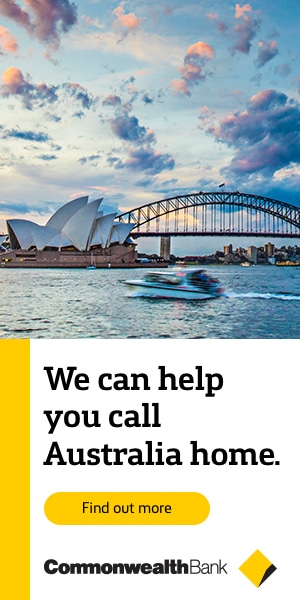Online quote request
A GUIDE TO RELOCATING TO AUSTRALIA
In Partnership with

A Guide to Relocating to Australia
Want to move to Australia? Relocating to Sydney? Considering moving to Melbourne or Perth? Here's the moving advice you'll need for any international removal to Australia.
Looking for a more colourful, relaxed or outdoors lifestyle? Moving to Australia from the UK could offer you all that and more. With more than 3 million square miles of nature, relaxing beaches and exciting cities, life in Australia will ensure that you’re never bored. Relocating to Sydney or Melbourne will allow you and your family a sunnier life full of opportunities. Although most of the 25 million citizens are concentrated in urban areas, their love of sport and friendly dispositions perfectly match the clear skies and sunny weather.
If you’re considering moving to Australia from the UK, here’s the moving advice you’ll need for any international move.
To make navigation of this page easier for you, we have added the below clickable menu and return buttons throughout.
- Living in Australia
- Moving Household Goods And Personal Effects To Australia
- Helpful Downloads
- Useful Links
- Additional Services
- Setting Up a Bank Account
- Moving Your Car Or Motorcycle
- Relocating Your Pets
- Restricted & Dutiable/Taxable Items
- Prohibited/Banned Items
Everything you need to help you plan your international move to Australia.
USEFUL DOWNLOADS
Everything you need to help you plan your international move to Australia.

Advice and Tips for Life in Australia
Australia: The Facts
Population: 25.7 million
Currency: Australian Dollar (AUD)
National Language: English
Capital City: Canberra
Unemployment Rate: 12%
Living in Australia
If your international move is in process, you might require some moving to Australia advice to better understand what life will be like down under. We’ve put together some tips to help answer your burning questions like: What age can you move to Australia? What are people like in Australia? What is the weather like?
Climate: While the sun might make a welcome change, it’s no joke in Australia. The heat can be really dangerous if you do not take the proper precautions, especially for families with young children. The sunny weather means that many people are fitness crazy, with many sports clubs and watersports being popular, which is hard to avoid upon moving.
Wildlife: The kangaroos and deadly spiders you may be expecting are not always as they seem. Kangaroos might even get a little old if you move to Australia, and there are only 2 species of deadly spider in the country, for which there are effective anti-venom treatments. So don’t let this put you off!
Slang: Despite Australians speaking English, you might find more of a language barrier than you expect. It’s worth looking up some common phrases before moving to Australia to reduce misunderstandings and ease your integration process.
Roads: Though the driving side is the same as in the UK, that doesn’t mean that you’ll find driving in Australia an easy feat. Signage in Australia can be quite different, so we recommend researching this before taking your first drive. The speed limits are also something to take into account, as you can be dealt a hefty fine – even for driving too slowly on main roads.
Cost of Living: Living in Australia will likely cost you approximately the same as living in the UK, however key areas, such as groceries, rent, and public transport, may prove more expensive in some areas. The following includes some key price comparisons between Australia and the UK.
- Pint of beer: Australia £4.45, UK £3.70
- Loaf of bread: Australia £1.55, UK £0.98
- Public Transport Month Pass: Australia £83, UK £65

Moving Household Goods And Personal Effects To Australia
Below is a list of the documents you will need when planning an international move to Australia:
- A Copy of your Passport Photo Page
- Completed Australian Customs Form B534
- Copy of Visa or E-Visa Approval (Applicable for Non-Citizens of Australia)
- Detailed Inventory / Packing list. We can provide this if packing for you. You can download a blank copy here to complete yourself
- Alcohol Inventory, if applicable
- The Original Bill of Lading if no Telex Release/Waybill issued (OBL) / Air Waybill (AWB). We will take care of this if performing the entirety of the move
We recommend providing these as soon as possible to reduce delays with your move to Australia. Late receipt of documentation can lead to missed shipments, additional charges and penalties at Australian Customs. For your own protection, we will almost never ship your goods without the above in place.

Useful Links
We always recommend speaking directly to the relevant embassy for the most accurate and up to date moving advice:

Popular Destinations in Australia
Global Moving Services is vastly experienced in international removals to cities all over the globe. Their long history and detailed knowledge of different countries makes them the perfect choice for your move. The cost of moving house to Australia will differ depending on your location. Here are some of the most popular destinations we are asked to move people to in Australia:
Perth (Western Australia), Fremantle (Western Australia), Alice Springs (Northern Territory), Darwin (Northern Territory), Cairns (Queensland), Townsville (Queensland), Mackay (Queensland), Gladstone (Queensland), Brisbane (Queensland), Newcastle (New South Wales), Sydney (New South Wales), Hobart (Tasmania), Melbourne (Victoria), Adelaide (South Australia), Canberra (Australian Capital Territory). Get a quote to one of these places

Additional Services
If you are unsure about what you need, one of our international move managers is always willing to help. Just call us on +44 20 7097 5335 , or fill out an international removal enquiry, and we’ll ease you through the process.
Moving Your Money
If you’re moving to Australia, it’s very likely you’ll have to exchange a large amount of currency. Many people waste thousands doing this through their bank as they think there is no alternative; but we partner with Global Reach who specialise in doing just this. Global Reach will offer all Global Moving Services customers preferential rates when exchanging currency and guarantee to beat other rates you’re receiving. Ask one of our move managers about this, to find out more click here or give us a call: +44 20 7097 5335
Get Insurance
We always advise taking out an insurance policy with us on every move. Although we like to think we’re the best in the industry, the odd accident can occasionally happen. For added peace of mind, make sure to speak to one of our move managers about this.
If you have already contracted us for your international relocation to Australia, then you can download the insurance form and email the completed form back to your international relocation manager.
Applying for a visa when moving to Australia
Step 1: Do your research
There are many different types of visas to consider when moving to Australia. You need to decide which category your move will fall under, and this might involve a considerable amount of research. If it is a permanent move, you will need to select the right Migration Programme for you. Research will help you to know what documentation, proof of identification and other documents will be necessary during the visa process. Your age will also play a role in the types of visas you can apply for.
Step 2: Application Form
Your next step will be to fill out the application form, which can sometimes be done online depending on your country of origin and the type of visa you’re applying for. What the form involves will also depend on the type of visa you are applying for. The application will include information about the required documents, so it’s a good idea to read this carefully to avoid mistakes and risk rejection. This form will require payment, so make sure to double check that the form of payment you’ll be using is accepted.
Step 3: Upload Supporting Documents
At this stage, you will need to scan all the required documents, as stipulated by the application form, and upload them. This is normally done online, however can be different if you are being sponsored for a visa. It’s important to thoroughly check your application and documents before sending them off, as it is harder to apply for a visa after having been rejected for poor documentation.
Step 4: Wait
Processing times for visas may differ depending on the type and time of year, so check regularly for updates.
Can I Move to Australia for Work?
Like most countries, you can move to Australia for Work with the appropriate visa and this is straightforward if you are aged 18-30 and only working for 6 months. The temporary holiday visa allows you to work in any capacity for a period of 6 months. If you plan on staying longer you will need to apply for a Skilled Migration visa with a lot stricter rules.
Getting a Job
If you’re moving to Australia, you might need to look for work before you move. Many industries in Melbourne, Sydney and Perth have skill shortages that talented international migrants can help to fill. It’s important to prepare your documents before you go, such as your CV, a list of references and previous employers’ details. If planning to move as a skilled migrant, you will need to allow your skills to be assessed by Australian authorities as part of your visa process.
Upon arrival, your qualifications may need to be revalued, as assessment differs from country to country. When living in Australia, you can find jobs in several ways, from local newspapers and LinkedIn to websites like indeed and CareerOne. If you are considering the cost of moving house to Australia, it’s important to note that your wages might just be higher once working.

Setting Up a Bank Account
Bank transfers
Before making any significant money transfers, we recommend doing some research. Transferring money between banks in Australia can cost quite a lot of money, so check out the rates before doing so.
Say hello to Commonwealth Bank of Australia
There’s a lot to look forward to when you move to Australia. Whether you’re surfing at a sunny beach, enjoying fresh seafood or commuting on a ferry over bright blue waters; every day will be an adventure. We want to make sure you have the confidence to move smoothly and easily, knowing there’s a financial partner at your side. That’s why we’re introducing you to Commonwealth Bank of Australia. They’re known to Aussies as CommBank.
Meet the bank more new arrivals choose.
CommBank is Australia’s largest bank. They’ve been helping Australian dreams come true since 1911, and support more people moving to Australia than any other bank.
With a variety of products and services, you can get your banking sorted in no time. Find helpful hints and tips about moving to Australia by visiting their Moving to Australia website.
Notable Benefits
- Australia’s largest bank.
- Bank on the go with the CommBank app.
- An extensive branch and ATM network available across Australia.
- Multi-lingual staff in some branches.
- ATMs with foreign language capabilities.
- Tips and guidance about moving to Australia available on CommBank’s website.

Moving Your Car Or Motorcycle
Below is a list of the documents you will need when planning to move your vehicle to Australia:
- Vehicle Import Approval (VIA)
- Registration papers from country of origin
- Purchase receipt
Additional Import Advice
Below is a list of the documents you will need when planning to move your vehicle to Australia:
- A VIA must be obtained prior to the importation of motor vehicles.
- The restrictions for documents and Customs regulations must be met for the importation for privately owned motor vehicles.
- Customs clearance is required at the port of entry.
- Customs duties and goods and services taxes (GST) must be paid at the time of vehicle import with the exception of returning Australian vehicles when GST only applies. GST only is payable on motorcycle imports.
- Contact the Australian Taxation Office to determine if and when luxury car taxes (LCT) must be paid. https://www.ato.gov.au/Business/Luxury-car-tax/

Relocating Your Pets to Australia
These documents will be required when planning to relocate your pet to Australia:
- Import Permit
- Import Application
Additional Import Advice
- All animals imported to Australia must meet the requirements of the Australian Department of Agriculture and Water Resources and will be quarantined upon arrival.
- Import Permits take approximately 10 business days from the date receipt by Department of Agriculture to be approved; however, incomplete or incorrect applications may take longer.
- Shippers must select a quarantine station for the animal prior to import.
- Animals may be visited by only the person identified as the importer during the quarantine period.
Note: It is critical to contact Department of Agriculture and Water Resources prior to the import of pets as requirements and restrictions are dependent upon the country of origin and vary dramatically per type of animal.

Restricted & Dutiable/Taxable Items
Think very carefully before moving these items to Australia. Items on this list will be taxed and/or require specific permission to import. In all cases they must be declared prior to you relocating to Australia:
- Antibiotics
- Asbestos
- Cat and dog fur products
- Cetaceans (whales, dolphins and porpoises)
- Anabolic and androgenic substances (those that enhance muscle and bone growth, and may include health supplements)
- Dog collars designed to puncture or bruise an animal’s skin
- Diamonds (only rough diamonds in tamper proof container from a country participating in the Kimberley Process may be imported and require a Kimberley Process Certificate)
- Counterfeit credit cards
- Fish and tooth fish
- Laser pointers
- Kava may be imported in root or dried form in amounts not to exceed 2 kg and is carried as accompanied baggage by a passenger 18 years or older
- Trade Practices Act goods
- Weapons (military goods and other weapons including blow pipes, crossbows, martial arts equipment, knuckle dusters, slingshots, maces and flails)
- Alcohol (Customs duties plus goods and services tax (GST) will apply to alcohol imported into Australia. Duty is calculated on the type of alcohol, the volume contained per bottle, the alcohol % per bottle and the value per bottle. Ten percent (10%) GST is then added to the duty calculated.)
- ANZAC and any related advertising material
- Items bearing an image of the Australian national flag and coat of arms
- Items bearing an image of the Australian state or territory flags and coat of arms
- Glazed ceramic ware
- Chemical weapons
- Chewing tobacco and snuff in quantities greater than 1.5 kg)
- Cigarette lighters (up to five lighters acceptable if over 18 years or older on a ship or aircraft)
- Cosmetics and toxic materials (cannot contain more than 250 mg/kg of lead but may contain more than 250 mg/kg of lead acetate designed for use in hair products)
- Crowd control equipment (antipersonnel sprays, body armour, extendable batons, electric shock devices, etc.)
- Cultural heritage goods from Papua New Guinea (permission from the Trustees of the Papua New Guinea Public Museum and Art Gallery is required)
- Passengers arriving on board a ship or aircraft do not need a permit for the import of drugs and narcotics required for personal use if: the drugs and narcotics are prescribed by a medical practitioner or veterinarian, and quantity does not exceed a three (3) month’s supply at the maximum prescribed dosage, and the drugs/narcotics are carried as accompanied baggage; prescription must be in English or translated to English.
- Firearms and accessories, parts, magazine, ammunition, components of ammunition, and replica
- The following items are embargoed goods and are restricted and require permission to import. Contact the Department of Foreign Affairs and Trade (DFAT) for additional information:
- Eritrea – weapons, ammunition, military vehicles and equipment and spare parts
- Iran – weapons, ammunition, military vehicle and equipment and spare parts
- North Korea – weapons ammunition, military vehicles and equipment and spare parts
- Libya – weapons, ammunition, military vehicles and equipment and spare parts
- Endangered animal and plant listed in the appendices to the Convention of International Trade in Endangered Species (CITES)
- Novelty erasers (resembling food in scent or appearance)
- Plastic explosives formulated as a mixture, malleable or flexible at room temperature or with one or more high explosives which in pure form have a vapour pressure less than 10.4 PA at a temperature of 25 degrees Celsius
- A binder material
- Electronic flyswatters and mosquito bats
- Growth hormones and substances of human or animal origin
- Hazardous wastes (explosive flammable, poisonous, toxic, exotoxin or infectious, clinical wastes, waste oils, waste residue from manufacture or household waste as defined by the Basel Convention)
- Hydrofluorocarbons
- Incandescent lamps
- Knives and daggers
- Novelty money boxes coated with material containing more than 90 mg/kg of lead
- Ozone depleting substances and synthetic greenhouse gases
- Pencils and paintbrushes with a coating that contains excess amounts of toxic compounds such as lead, arsenic and barium
- Pesticides and other hazardous chemicals
- Polychlorinated Biphenyls, Terphenyls and Polyphenols
- Pornography and other objectionable materials
- Woolpacks
- Radioactive substances
- Therapeutic drugs and substances (abortifacients, aphrodisiacs, etc.)
- Unmanufactured tobacco (not stemmed or stripped or in whole form)
- Toys containing excess amounts of toxic compounds such as lead, arsenic and barium

Prohibited/Banned Items
Do not move any of these items to Australia:
- Dogs (dangerous breeds including Dogo Argentino, Fila Brasileiro, Japanese Tosa, American Pit Bull Terrier or Pit Bull Terrier, Perro de Presa Canario or Presa Canario and advertisements referencing these breeds
- Embryo clones and viable materials, and any related advertising matter advertising these items
- Suicide devices
- Rough diamonds (see provision under Restricted/Dutiable Items)
- The following additional items are prohibited in GMS Baggage/Courier Consignments:
- Aerosols (all kinds, Hairspray, Deodorant etc)
- Aftershaves / Perfumes / Fragrances
- Airbags
- Alcoholic Drinks or Bottles
- Ammunition of any kind
- Animals of any kind (Dead or Alive)
- Any items containing Petrol (Liquid, Gas or Fumes)
- Biological Samples
- Car Batteries
- Cash & Cards (Credit / Debit)
- Chainsaws
- Cheques (Bank)
- Christmas Crackers
- Counterfeit Currency
- Dangerous Goods
- Driving Licence
- Drugs (Including Prescription)
- Engines
- Excrement / Filth
- Fire Extinguishers
- Fish (Dead or Live)
- Foodstuffs (all kinds)
- Hazardous Goods
- Human Remains (including ashes)
- Infectious Substances
- Knives
- Laptop Computers, Mobile/Smart Phones or Tablets
- Lighters
- Lottery Tickets
- Nail Varnish / Nail Varnish Remover
- Oils
- Paints
- Passports
- Perishable Goods (All)
- Plants / Seeds etc
- Printer Toner
- Seatbelt Tensioners and Steering Wheels
- Stamps
- Tobacco
- Water
- Weapons (all kinds, including replicas)
- Windscreens
Disclaimer: Customs regulations can change at any time with or without notice. This information is provided as a guide only. While Global Moving Services has exercised reasonable care in publishing this information, Global Moving Services makes no representation, either expressed or implied, as to its accuracy or applicability.








